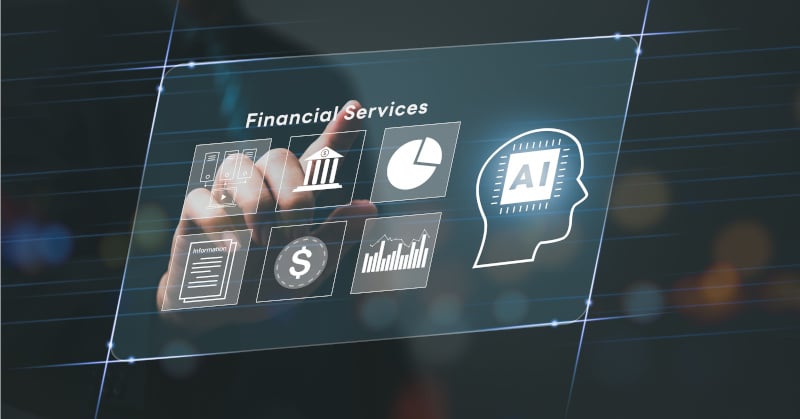Last month, I discussed the not-so-new topic of cloud accounting and how it’s helping solve cybersecurity and retention challenges. Now, let’s examine how artificial intelligence (AI) is further transforming the accounting profession, particularly in staffing, retention, and cybersecurity.
In this post, we'll discuss:
- How firms are using AI to attract (and effectively multiply) employees
- The truth about AI’s impact on job replacement in accounting
- Best practices for securely using accounting AI processes
AI-savvy staff members: The new gold standard
AI accounting has emerged as a game-changer. It significantly increases speed and efficiency (with near-perfect accuracy) across various aspects of the profession.
From data collection to research, its impact is undeniable.
While we can’t say, “one AI power user is worth ten AI novices” or quantify it in terms of employee equivalence, there’s no question that those who use AI at work are achieving more, and accounting leaders are taking notice.
The productivity boost is being recognized in the job market
According to a study by Amazon, “employers are willing to offer up to a 47% increase in base salary for employees proficient in AI.” This substantial premium reflects the value AI-savvy workers bring to the table. And employers aren’t just offering higher salaries; they’re entrusting those employees with more responsibilities—right off the bat. Instead of being bogged down with mundane, repetitive tasks, AI-proficient staff are tackling complex projects.
Now—the question arises—could hiring an AI-savvy staff member be your firm’s competitive differentiator? Possibly.
When it comes to hiring, offering more money for an AI-savvy staff member will make your firm stand out to prospective employees.
When it comes to clients, in a profession where efficiency and accuracy are paramount, having a team member who’s effectively using AI tools sets your firm apart.
Not all businesses are taking the same approach
It’s important to note that not all businesses are taking the same approach when addressing the accounting talent shortage.
Instead of fighting to get talent in the dried-up talent pool, some businesses are using existing infrastructure to effectively ‘multiply’ employees:
- Puzzle, an accounting startup, is "leveraging AI and automation to streamline accounting and financial management where there is a talent shortage”. This approach allows them to maintain high-quality service delivery despite the challenges of finding skilled accountants.
- Procurify, a procure-to-pay software company, has adopted a strategy of scaling with technology and leaning into automation instead of relying solely on increasing headcount. This tech-centric approach enables them to grow their capabilities without being constrained by the limited talent pool.
AI is a versatile solution for accounting. Whether you’re using it to attract top talent by offering premium starting salaries or to offset dwindling staff numbers, one thing’s clear: AI is becoming the accounting profession’s staffing shortage solution.
The truth about AI and job replacement
The phrase “AI won’t replace your job; people who know how to use AI will” has become a sort of mantra in discussions about the future of work. But what does this really mean for accounting professionals?
While there’s no evidence that human CPAs are being replaced with robotic counterparts quite yet, we are witnessing a more nuanced transformation. Specific subsets of a CPA’s job are being augmented or replaced by robotic process automation (RPA) and AI.
To understand this shift, let’s break down a typical accounting job into tasks:
- Predictive tasks: AI excels in forecasting financial trends and identifying potential risk areas, allowing accountants to shift from a reactive to a proactive stance, anticipating challenges before they arise.
- Generative tasks: AI's timesaving potential in this area is immense. From drafting reports and emails to generating financial statements based on input data, AI can significantly streamline these processes.
- Data-driven tasks: One of AI's most impressive feats is its ability to sift through vast amounts of data to extract relevant insights. This makes data analysis more efficient, accurate, and comprehensive.
Where does that leave human CPA? Far from being obsolete, accountants find themselves with more time and cognitive bandwidth to focus on what truly matters: making informed decisions and crafting creative solutions for clients. The accountant's role is evolving from a number-cruncher to a strategic advisor, leveraging AI accounting insights to provide higher-value services to clients.
This evolution underscores the importance of embracing accounting AI as a tool rather than viewing it as a threat. By doing so, accountants can enhance their capabilities, offer more sophisticated services, and ultimately secure their place in an AI-augmented future.
Best practices for using accounting AI securely
While AI and automation offer significant efficiency gains and opportunities for innovation in accounting processes, they also introduce new risks.
One of the primary concerns is data security. The information input into AI tools is typically stored in a database, making it crucial to avoid entering any proprietary or personal information that could be compromised.
To help navigate these challenges, here are some best practices for using AI tools securely in your accounting practice:
- Expert evaluation: Before implementing any AI solution, get an expert to evaluate it thoroughly. Work closely with your IT staff to assess the solution’s security protocols. Simultaneously, collaborate with your accounting team to identify specific use cases and establish clear guidelines for the tool's application. The critical question to answer is this: Will this AI solution help you perform your job more quickly, efficiently, and accurately? Make its purpose and limitations abundantly clear to all users.
- Choose accounting-specific AI tools: Opt for AI tools specifically designed for accountants, such as Spark, VIC.AI, BILL, and others. These specialized tools are tailored to accounting processes, making them easier to adopt. (More importantly, their support agents will be familiar with your specific workflows and security standards, providing more targeted assistance when needed.)
- Rigorous security checks: Conduct thorough security checks before integrating any AI tool into your daily routine. Key questions to consider include:
- Does the tool encrypt its data?
- How is access controlled?
- Does it build its database using other users' entries?
- What are the tool's data retention and deletion policies?
Addressing these questions will help eliminate uncertainty and ensure that your firm’s use of AI meets its security standards and client confidentiality requirements.
Ready to experience the benefits of AI accounting firsthand?
As Emily Frels wrote in her post on the tech taking over accounting in 2024, AI “will continue to shape the profession.”
It’s time to lean into what generative AI tools can do for you, your career and your future.
Ready to try it out for yourself? Check out Spark, Rightworks’ purpose-built AI tool for accounting firms.
Sponsored Content: This article is generously brought to you by one of our valued sponsors. Their support enables us to continue delivering expert insights and the latest industry trends to our dedicated community of accounting professionals.
.png?width=150&height=63&name=TWRlogo-regmark_blueblack%20(1).png)
.png)










Do you have questions about this article? Email us and let us know > info@woodard.com
Comments: